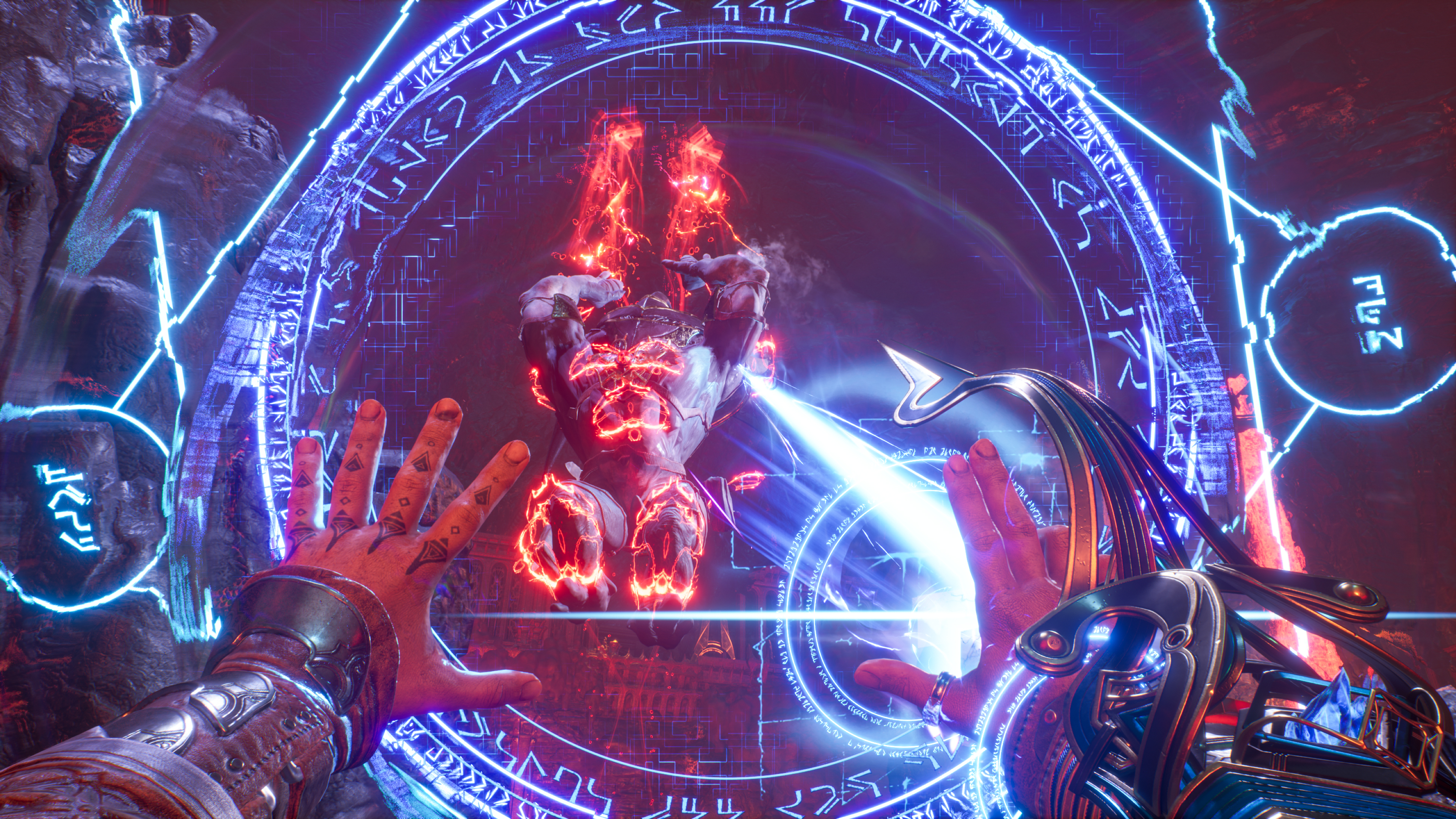
Immortals of Aveum is a poster child for the bad habits of modern blockbuster game design. This debut title from developer Ascension Games has everything it needs to be a fantastic shooter: an imaginative concept, dazzling combat, and colossal set-pieces. But it clearly lacks confidence in its simple premise and fantasy world, stuffing itself with needless distractions and the most obnoxious writing this side of Forspoken. At its best, Immortals of Aveum can be thoroughly entertaining. But seeing its highs requires tolerating some irritating lows.
Release date: August 22, 2023
Platform(s): PC, PS5, Xbox Series X
Developer: Ascension Games
Publisher: EA
Dubbing itself a "First Person Magic Shooter", Immortals of Aveum takes the FPS fundamentals as reimagined by id's 2016 reboot of DOOM, then replaces the demons and guns with sorcerers and spells. And it is a direct replacement, with most basic spells functioning like staple weapons from the best FPS games. Your spell-slinging Immortal can wield three color-coded types of magic. "Blue Magic" charges your open palm with long range bolts of energy akin to semi-automatic rifles. "Red Magic" revolves around close-range, high-damage spells similar to shotguns and grenade launchers, while "Green Magic" unleashes rapid fire projectiles much like an SMG or a chaingun.
Shockwave
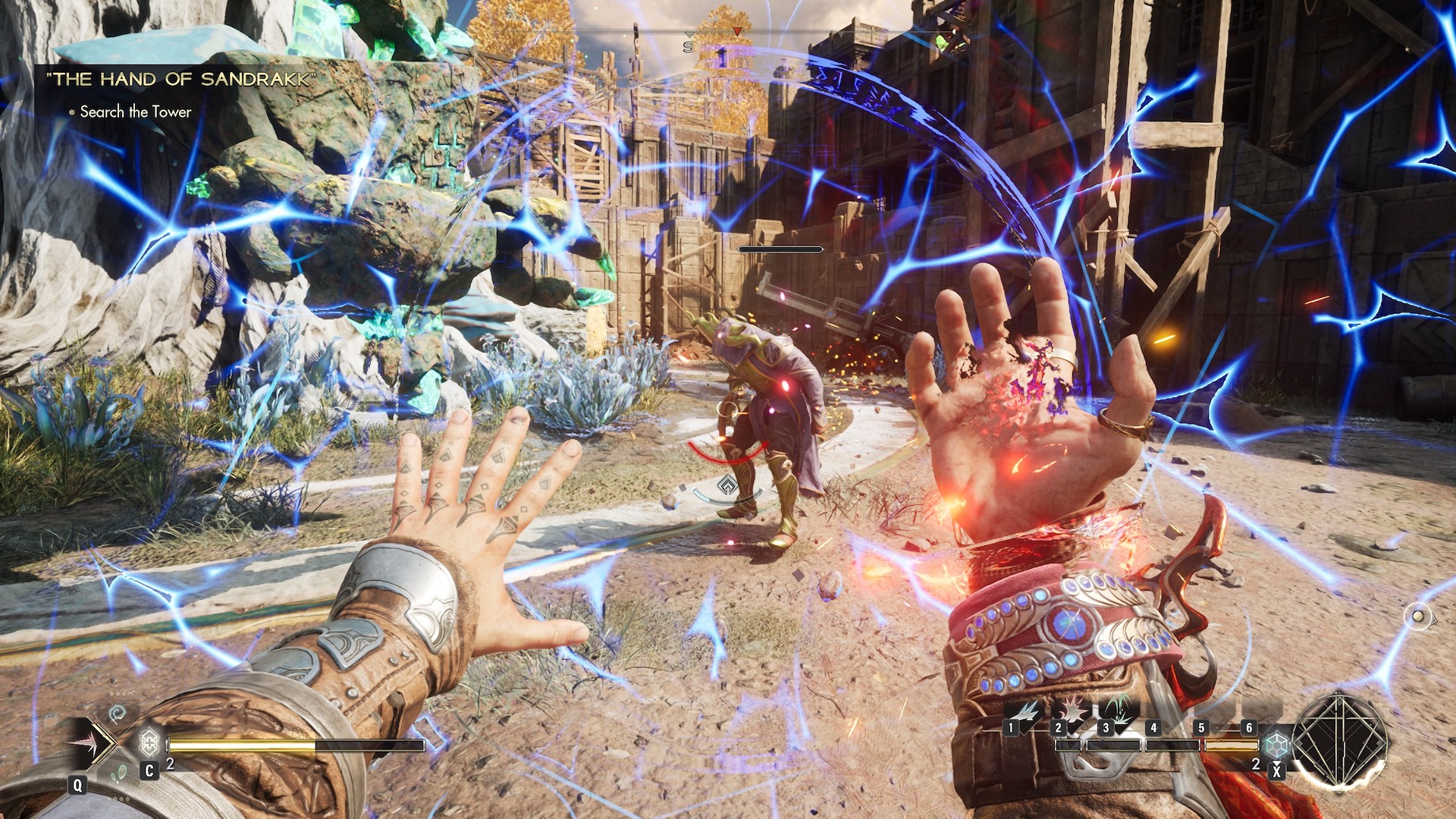
You could argue this represents a missed opportunity to do something weirder within the FPS genre, as there's no reason for the spells to work this way beyond the comfort of familiarity. Nonetheless, contextualizing the basic arsenal in this manner is a useful shorthand for learning the combat. Moreover, these firearm-like spells aren't the only powers you wield. While your right hand deals damage, your left conjures more manipulative magic, lassoing enemies toward you with a conjured whip, coating them in time-slowing goop, and countering their spells with a disrupting beam of light. You can also unleash a range of more powerful "ability" spells, like a shockwave that disrupts enemy shields and catapults enemies into the air, and a tasty leaping punch that deals high damage and shreds enemy armor.
All of this comes together to form a kinetic, tactile, and surprisingly challenging shooter, particularly in its latter half. Many enemies are just as powerful and mobile as you are, and there are a suite of optional bosses and arena challenges that are supremely difficult to beat. Alongside your aggressive spells are a couple of defensive abilities, like the now-obligatory double-dash, and a shield you can conjure that deflects attacks. The latter includes a pleasing flourish whereby, when it breaks, time slows for just long enough for you to figure out your next move. In any case, you'll need to deploy both with precision to survive the game's tougher encounters.
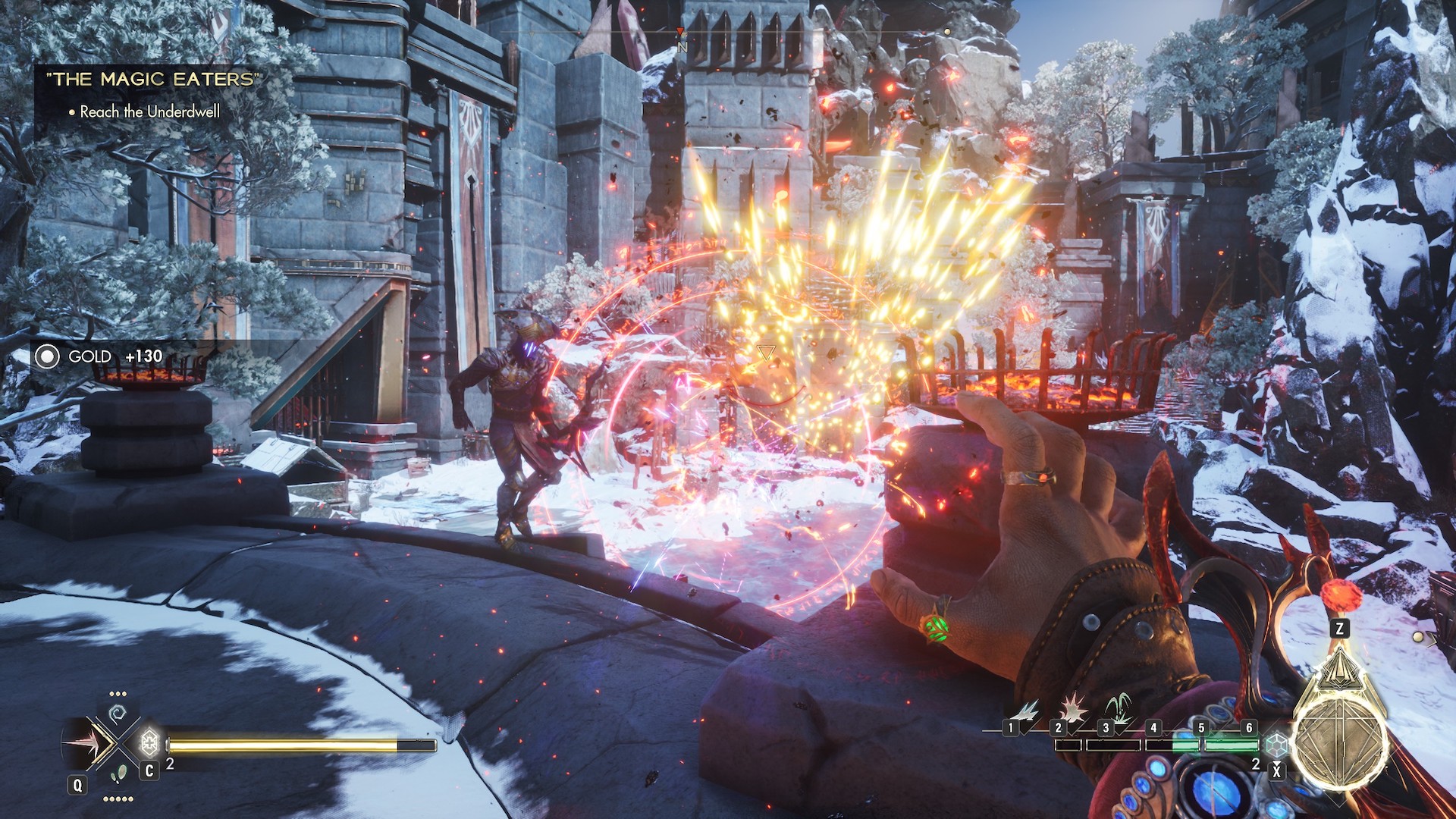
Combat also looks incredible. When the fighting's in full flow, the screen becomes an incendiary kaleidoscope of bolts, beams, sigils, and shockwaves. The use of particle effects is particularly impressive. I wouldn't be surprised to discover the developer looked at what modern video game tech can do with particles and said "Let's make a game based around that." Credit should also go to the Ascension's environment artists, who eke some thrillingly massive set-pieces out of the fantasy setting, including a level where you fight on the inside and outside of a mechanical colossus, although the tradeoff for that is an overabundance of levels that take place in caves.
The core of Immortals of Aveum is perfectly enjoyable. It's everything around it that causes problems. To start with, it takes a long time for the game to find its flow. The opening few hours are far more concerned with introducing the world and story than delivering a fun FPS experience. Starting out as an untapped Magnus (Immortals' word for mage) named Jak, the opening quarter of the game is a whistle stop tour of Jack's rise from overgrown urchin who lives in a slum built beneath a giant bridge, through frontline soldier in a conflict known as the Everwar, to becoming an Immortal, the magical special forces arm of one of the game's two warring factions.
A question of consistency
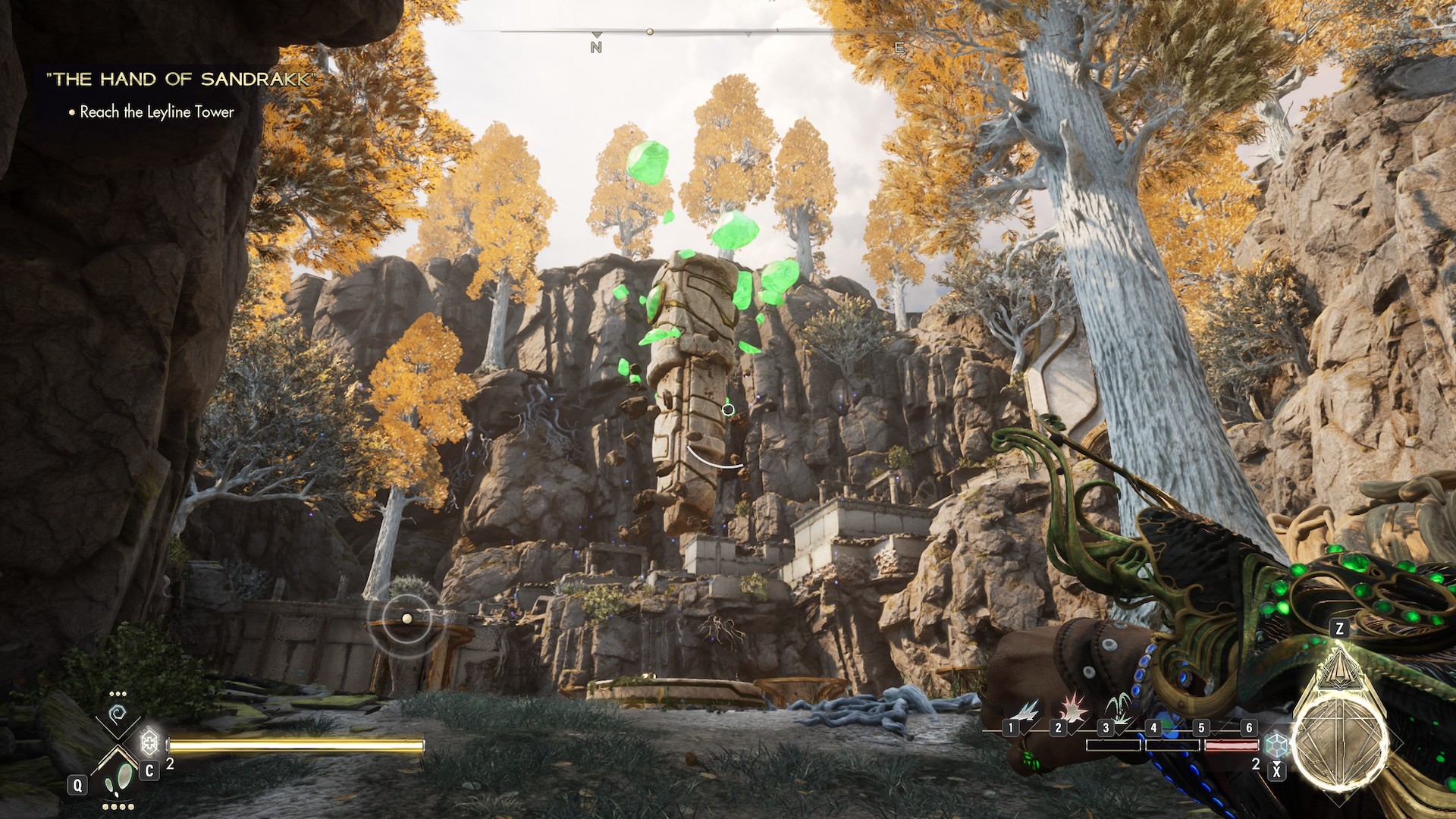
As fantasy worlds go, it isn't breathtakingly original, but it is well presented, and I like that its conflict isn't a typical "good versus evil" affair. Neither side really remembers what it's fighting for, and both are trapped in a cycle of justifying committing atrocities because of atrocities committed by the other side. The problem is how the story is delivered. It constantly interrupts the flow of the action with lengthy cutscenes, ox-patting sequences, and superfluous branching-dialogue conversations that often take place right after cutscenes. It's all highly inelegant, and within it the game struggles to find its rhythm.
This approach might be more successful if the writing sold you on the world better. Unfortunately, the script is riddled with knockoff Whedonesque ironical banter that is profoundly unfunny, making it challenging to truly immerse yourself in the story. Imagine if Frodo said "Well, that just happened" every five minutes in The Lord of the Rings, and you've got some idea of what Immortals of Aveum considers funny. What's most frustrating about this is when the game does take itself seriously, the writing's fine. Jak works as a young, headstrong protagonist, the villain is a suitably charismatic bastard. There are some good vocal performances here too, when the actors aren't forced to spout the same tired blend of C-tier Marvel movie humor.
It suggests a fear of being earnest, and sadly that fear isn't limited to the writing. Immortals of Aveum is a single-player FPS at a time when games can't just be that anymore. Consequently, it's laden with a ton of unnecessary baggage. First, there's an awkwardly implemented Metroidvania structure, where between missions you can explore certain areas of the world for extra rewards.
It's akin to what Star Wars Jedi: Survivor did earlier this year, and arguably has more tangible rewards than Survivor's bizarre "beard in a box" approach. But the structure of the story is far less suited to accommodating this semi-open design, and Immortals is nowhere near as good a platformer as it is a shooter. There are some mildly diverting puzzles though, which outside of combat is probably where Immortals shines brightest.
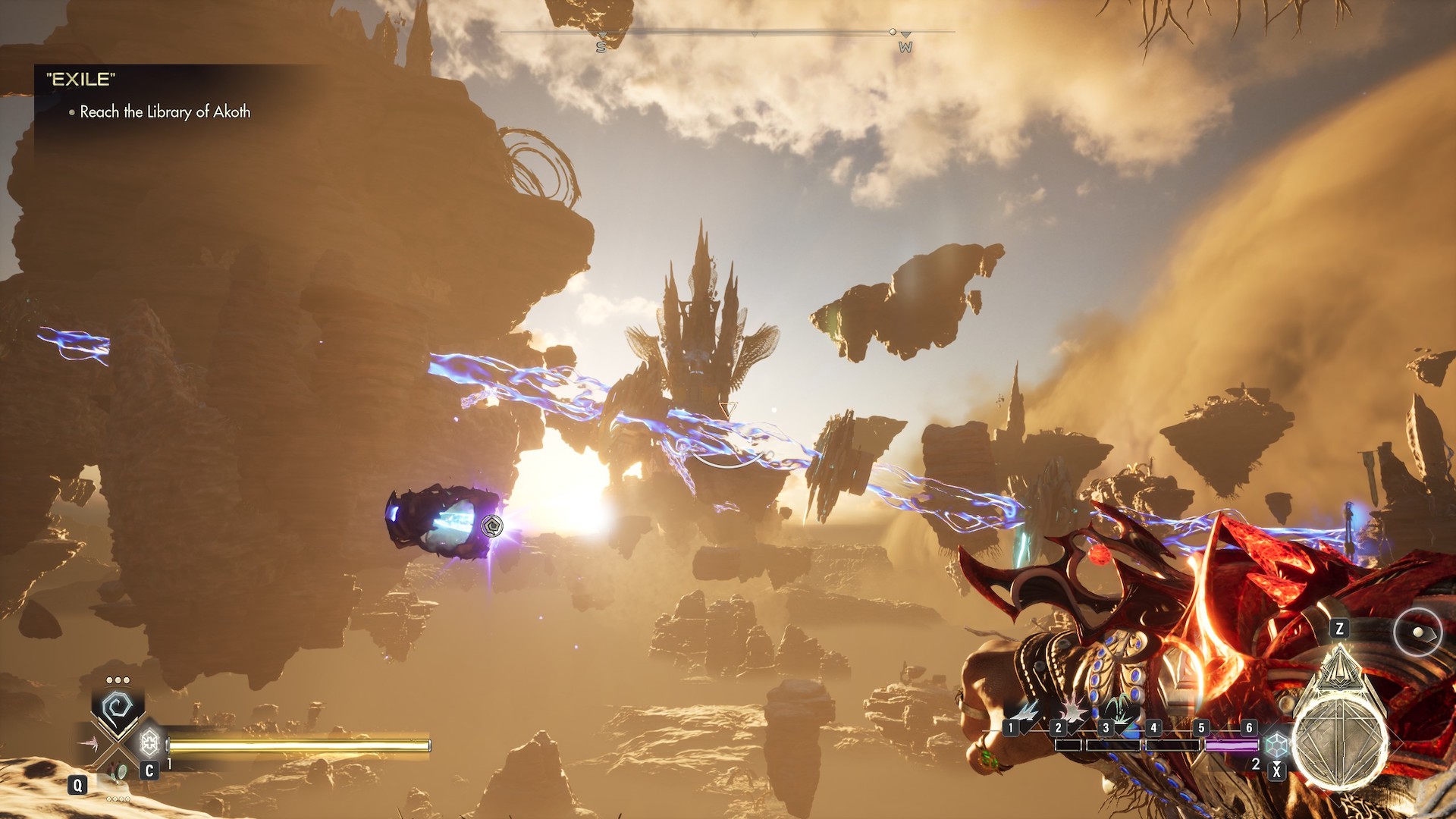
The bigger problem is that those rewards I mentioned come in the form of loot. Yes, Immortals of Aveum is technically a looter-shooter, with tiered "numbers-go-up" weapons, gear scores, and more gleaming chests than you'd find in a bodybuilding competition. But Immortals lacks the breadth of weapon types and underlying systems to make this stuff anything like interesting. So instead of having 10 distinctive, meticulously designed weapons that you acquire at set intervals, you have a hundred weapons that are all based around the same handful of archetypes, which threatens to flatten the game's power curve. Fortunately, there are other abilities which you do acquire at set intervals, meaning Ascension Games can still build combat challenges to reflect that.
All this serves to dilute and distract from what Immortals of Aveum does best, namely colorful, imaginative first-person spellcasting in colossal fantasy environments. It's a stark demonstration of what a lack of confidence in your core vision can do. There is a good shooter in Immortals of Aveum, maybe even a great one, but you'll have to do some digging to find it.







